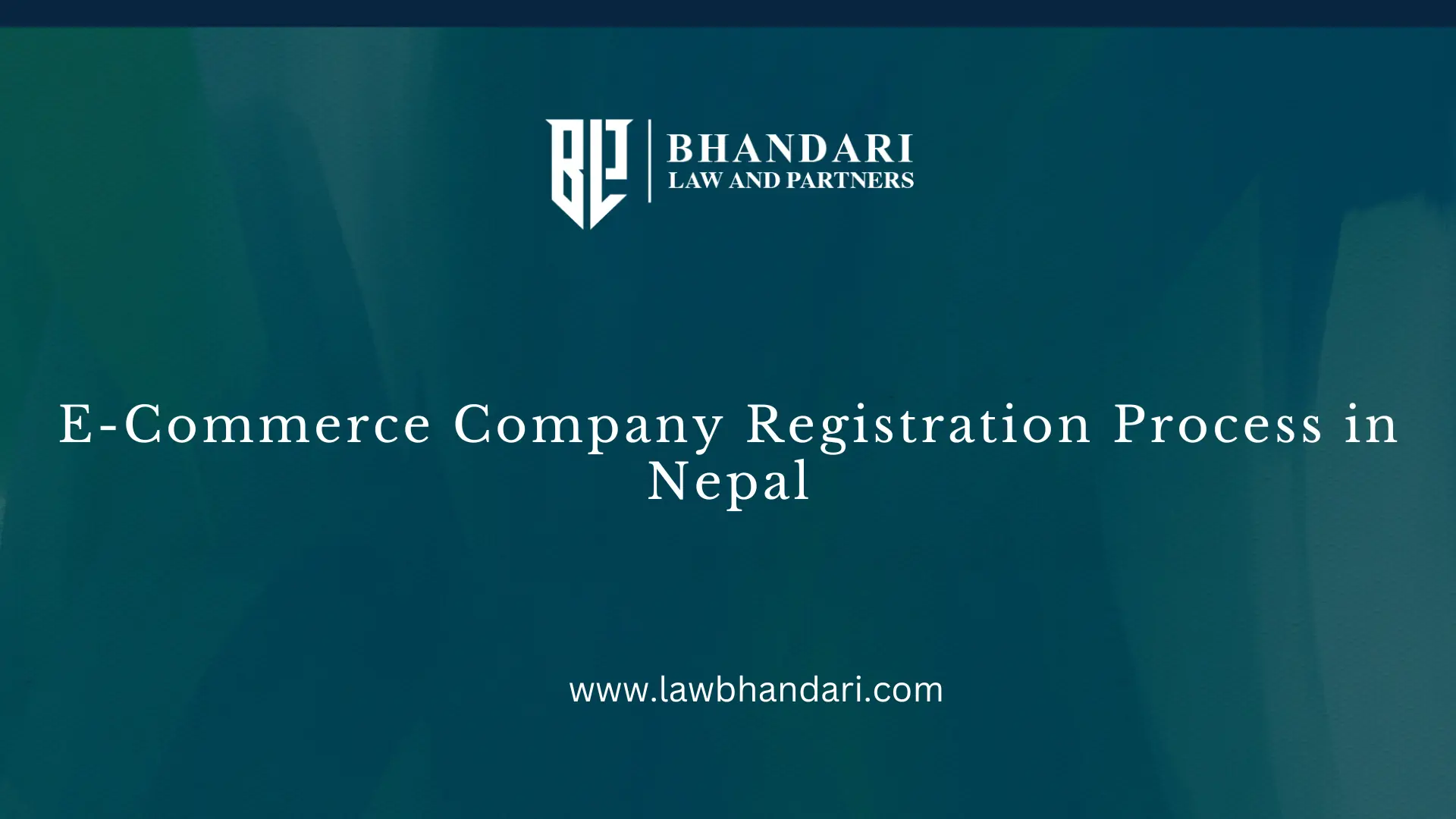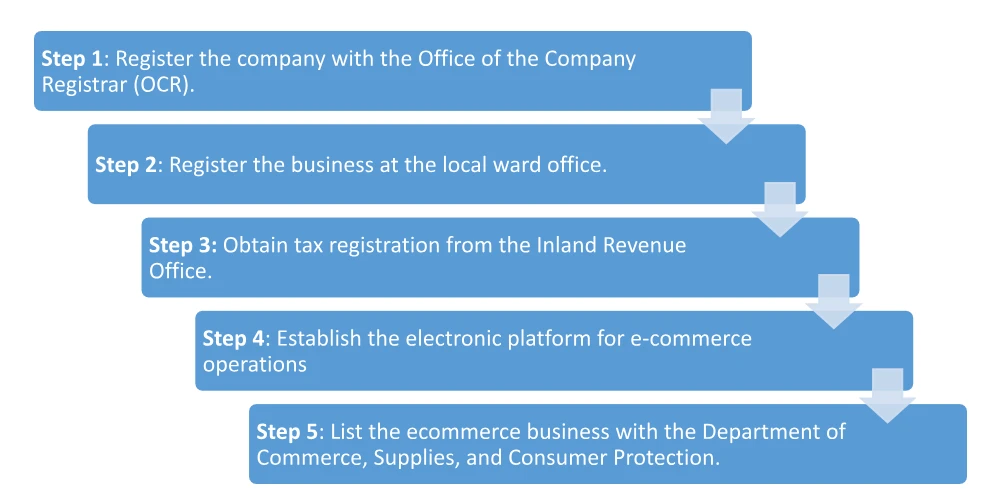Table of content
-

E-Commerce Company Registration Process in Nepal
01. Background of E-Commerce Law in Nepal
Nepal has recently introduced the E-commerce Act, 2025(2081) (“Act”) that was certified on 16th March, 2025 (2081/12/3) and shall come into effect on the thirty-first day from the date of certification. It regulates the E-commerce business, ensuring consumer rights, fair trade practices, and compliance with business.
This Article outlines the incorporation of E-commerce business in Nepal including its compliance based on newly introduced Act.
02. Governing Law of Ecommerce in Nepal
Following are the primary law regulation registration of ecommerce company in Nepal:
| S.No. | Law | Scope |
|---|---|---|
| 1. | Companies Act 2006 (2063) | Regulates company registration and operation of company in Nepal. |
| 2. | E-commerce Act, 2025 (2081) | Regulates listing and compliance of e-commerce companies in Nepal. |
03. Governing Authority For E-commerce Business in Nepal
| S. No. | Authority | Responsibility |
|---|---|---|
| 1. | Office of Company Registrar (“OCR”) | Authority where companies are registered. |
| 2. | Department of Commerce, Supplies and Consumer Protection (“Department”) | Handles listing of e-commerce companies and monitors their operations. |
04. Applicability of E-Commerce Act?
The E-Commerce Act, 2025(2081) applies to all individuals and entities, regardless of their physical location, that engage in the sale or delivery of goods and services within Nepal using digital means.
An “Electronic platform” refers to a system designed for the purpose of conducting transactions of goods or services through the collection, transmission, or storage of information using computers, mobile devices, or similar electronic equipment via websites, applications, software, the internet, intranet, or marketplaces on social media platforms. The act does not explicitly address whether basic digital tools like emails or messaging services that used to assist in commercial exchanges are considered e-commerce.
The act defines "E-commerce" as transactions involving the purchase or sale of goods or services conducted through electronic platforms. However, the mere promotion or dissemination of product or service information via such platforms does not constitute e-commerce under the Act.
The Act raises practical concerns about whether entities already regulated under other legal frameworks, such as payment gateways or financial service providers, are expected to comply with overlapping requirements under the E-Commerce Act. Similarly, businesses that extend their operations from physical stores to online platforms (the brick-and-click model) could face uncertainty regarding their obligations.
In essence, the Act adopts a broad, one-size-fits-all definition of e-commerce, which may hinder ease of doing business. It encompasses all forms of transactions conducted via electronic means or the internet whether by small businesses, online marketplaces, or individual company websites without distinguishing between their scale or operational models.
05. Ecommerce Company registration Process in Nepal
The starting of an e-commerce company in Nepal involves completing several regulatory and operational steps to ensure legal compliance and smooth operations.
Step 1: Register the company with the Office of the Company Registrar (OCR).
Step 2: Register the business at the local ward office.
Step 3: Obtain tax registration from the Inland Revenue Office.
Step 4: Establish the electronic platform for e-commerce operations.
Step 5: List the e-commerce business with the Department of Commerce, Supplies, and Consumer Protection.

Note: The process of company formation shall take 20 to 25 days and further it shall take 7-10 days to be listed in the Department.
06. Duties of Parties Involved in E-commerce
The act has identified the five distinct parties to the E-commerce Business and their duties. They are as detailed as I can make the table:
| S.No. | Parties | Duties |
|---|---|---|
| 1 | Buyer |
|
| 2 | Seller |
|
| 3 | Intermediary Business |
|
| 4 | List-Based Business |
|
| 5 | Courier |
|
07. Listing Requirement for E-commerce business
After the establishment of the electronic platform, the business should apply for listing in the digital business portal established by the Department. The Department should provide the listing number within 7 days of submission to application for listing with required documents. Non-compliance with this requirement shall attract a penalty ranging from NPR 20,000 to NPR 100,000.
08. Recognition of Electronic Contracts under the E-Commerce Act, 2025
The section 7 of the act recognizes electronic contracts between buyers and businesses or business and seller as legally valid and enforceable, requiring clear terms on delivery, cancellation, returns, warranties, and refunds. It broadens the acceptance of digital signatures beyond previous laws, formally validating agreements like “click-to-accept agreement”s where users actively consent by clicking “I agree.” This strengthens trust and efficiency in online transactions by ensuring such electronic agreements are binding when proper notice and consent are provided.
09. Compliance for E-commerce Business
This act has made key provisions regarding compliance and requirements related to E-commerce
a. Establishment of Electronic Platform
The platform should have details regarding the business and its incorporation document, along with documents like tax registration certificate, license certificate, contact information, customer care contact, and grievance handling unit in such a way that the buyer can take an informed decision regarding their trade or business at any time
b. Information
E-commerce Act has made the provision of the display of information on goods and services compulsion. Any change in the business details should be updated on the platform within forty-eight (48) hours of making such changes.
Furthermore, the business should provide adequate information on the electronic platform, including the business registration certificate, PAN certificate, contact details, customer care information, type of e-commerce, and applicable licenses.
c. Return and Refund Policy
If the goods or services purchased by a buyer do not match the description provided by the business, the buyer has the unconditional right to return them, provided they are unused and undamaged. The business is obligated to accept the return and provide a full refund including any taxes paid, without imposing any conditions, unless the buyer voluntarily agrees to an exchange.
d. Privacy Policy
Businesses must protect personal data collected through e-commerce and use or transfer it only as permitted by law, except for transaction-related needs. Users must be able to access, update, or disable their personal information and identifiers.
e. Grievance Redressal Mechanism
The Act requires businesses to provide accessible complaint channels to implement an online grievance redressal system, either electronic, written, or in-person, for consumers dissatisfied with goods or services. Complaints must be registered and acknowledged promptly, investigated, and resolved within 15 days. Additionally, existing Consumer Protection Act rules apply to e-commerce sales, covering product quality, labeling, returns, pricing, inspections, dispute resolution, and consumer rights.
10. Offence Under the Ecommerce Act
Entities engaged in e-commerce must not involve themselves in unfair trade practices or business malpractices, as such violations are subject to legal action. E-commerce platforms are held liable for complaints related to goods or services sold through their platform, even if they are not the direct providers.
Common offenses include operating without registration, failing to disclose essential product information, and violating intermediary obligations. Fines for such offenses range from NPR 20,000 to NPR 100,000, with the right to appeal to the Director General within seven days.
Severe offenses may attract harsher penalties, including fines between NPR 40,000 and NPR 500,000, imprisonment for six months to three years, or both. Designated officers are responsible for investigating these offenses and referring cases to government attorneys. Prosecution takes place in the newly established ‘Consumer Court,’ with the Government of Nepal representing the public interest in such cases.
Published on July 1 2025
Disclaimer: This article published on website is just for information purpose only. It shall not be taken as the legal advice, advertisement, personal communication, solicitation or inducement. Bhandari Law and Partners or any of the team members of the firm shall not be liable for the consequence arising of the information provided. As the factual situation may be different on your case, thereof if you need further legal advice on the subject matter, please Contact Us.
Related Professionals:
Frequently Asked Question
For quick legal assistance:
You can directly call to our legal expert: +977-9808811027
Even can call or drop a text through What’s app , Viber, Telegram and We Chat at the same number.
Also can do email on : info@lawbhandari.com
contact us
Phone :,
,Connect with our professional lawyers in Nepal :
Follow Our Law Firm on Social Media :